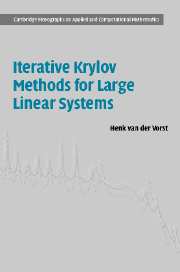Book contents
- Frontmatter
- Contents
- Preface
- 1 Introduction
- 2 Mathematical preliminaries
- 3 Basic iteration methods
- 4 Construction of approximate solutions
- 5 The Conjugate Gradients method
- 6 GMRES and MINRES
- 7 Bi-Conjugate Gradients
- 8 How serious is irregular convergence?
- 9 Bi-CGSTAB
- 10 Solution of singular systems
- 11 Solution of f (A)x = b with Krylov subspace information
- 12 Miscellaneous
- 13 Preconditioning
- References
- Index
1 - Introduction
Published online by Cambridge University Press: 24 November 2009
- Frontmatter
- Contents
- Preface
- 1 Introduction
- 2 Mathematical preliminaries
- 3 Basic iteration methods
- 4 Construction of approximate solutions
- 5 The Conjugate Gradients method
- 6 GMRES and MINRES
- 7 Bi-Conjugate Gradients
- 8 How serious is irregular convergence?
- 9 Bi-CGSTAB
- 10 Solution of singular systems
- 11 Solution of f (A)x = b with Krylov subspace information
- 12 Miscellaneous
- 13 Preconditioning
- References
- Index
Summary
In this book I present an overview of a number of related iterative methods for the solution of linear systems of equations. These methods are so-called Krylov projection type methods and they include popular methods such as Conjugate Gradients, MINRES, SYMMLQ, Bi-Conjugate Gradients, QMR, Bi-CGSTAB, CGS, LSQR, and GMRES. I will show how these methods can be derived from simple basic iteration formulas and how they are related. My focus is on the ideas behind the derivation of these methods, rather than on a complete presentation of various aspects and theoretical properties.
In the text there are a large number of references for more detailed information. Iterative methods form a rich and lively area of research and it is not surprising that this has already led to a number of books. The first book devoted entirely to the subject was published by Varga [212], it contains much of the theory that is still relevant, but it does not deal with the Krylov subspace methods (which were not yet popular at the time).
Other books that should be mentioned in the context of Krylov subspace methods are the ‘Templates’ book [20] and Greenbaum's book [101]. The Templates are a good source of information on the algorithmic aspects of the iterative methods and Greenbaum's text can be seen as the theoretical background for the Templates.
Axelsson [10] published a book that gave much attention to preconditioning aspects, in particular all sorts of variants of (block and modified) incomplete decompositions. The book by Saad [168] is also a good source of information on preconditioners, with much inside experience for such methods as threshold ILU.
- Type
- Chapter
- Information
- Iterative Krylov Methods for Large Linear Systems , pp. 1 - 14Publisher: Cambridge University PressPrint publication year: 2003

